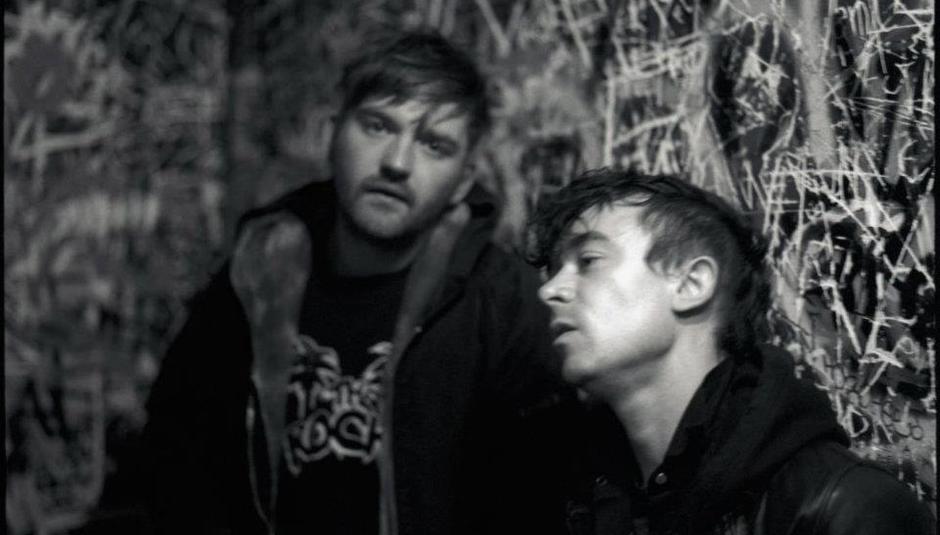Three years have passed since London duo The Big Pink arrived on the scene amidst a halo of white noise and looped beats courtesy of still awesome debut 7" 'Too Young To Love'. Derided by some due to their high profile connections, The Big Pink's live shows also gained a reputation for being both sublime (Camden Crawl 2009 - Dingwalls) and infuriating (Leeds Festival 2010) while debut long player A Brief History Of Love, released in the autumn of 2009 proved just as frustrating, mixing moments of pure brilliance with forgettable slabs of filler in between.
Having spent the past twelve months taking stock, writing, and finally piecing together the follow-up, Future This, 2012 is shaping up to be something of a make or break year for The Big Pink. Still signed to legendary independent 4AD, their dedication to creating an ambitious second album unflappable, DiS finds songwriter, guitarist and affable frontman Robbie Furze in buoyantly high spirits this cold December afternoon. The discussion veers from "lost songs" - the last time we spoke Furze had intimated several new compositions would be released imminently - to line-up changes, settling on the right producer, and Nicki Minaj.
DiS: The last time we spoke, two years ago, you mentioned a song you'd just written called 'Doom Generation', which was already being incorporated into the band's live set. At the time producer Chris Zane was meant to be working on the recording, but as yet the track hasn't been released and isn't on Future This. What happened to the recording and will it ever see the light of day?
Robbie Furze: We went to New York and recorded 'Doom Generation', and after we'd finished it did become a regular part of our live set, yet at the same time it was one of those songs we weren't really comfortable with. For whatever reason it didn't quite cut it. It's still lying around so maybe we could stick it out as an old bootleg or something like that? I'd totally forgotten about it until you just mentioned it to be honest!
DiS: I've been listening to Future This for the past few weeks and there's a definite progression, particularly on the second half of the album, whereas 'Stay Gold' sounds like it could have fitted onto A Brief History Of Love quite easily.
RF: 'Stay Gold' was the first song we wrote for Future This. We wrote that at the end of 2010 straight after we'd finished touring A Brief History Of Love, and went into the studio with Paul (Epworth) almost immediately, so it does have that similar kind of feel about it. I guess that could be our bridging song from the first record. But then we had a lot of other ideas that were very different to A Brief History..., so in that sense Future This is definitely a progression. A lot of these ideas had already been discussed while we were touring the first record, and they just escalated into songs like 'Give It Up', 'Rubbernecking' and '77', which are all very different to anything off A Brief History Of Love.
DiS: The songs certainly seem more beat-driven and processed here whereas A Brief History Of Love seemed to have a wall of noise element running through it. Have you changed your approach to writing and producing songs over time?
RF: It was more about wanting to create the next chapter for The Big Pink really. We felt that we'd already done the whole wall of noise thing with the first record, and for me after making the record then touring the hell out of it I didn't want to pick my guitar up again. I'd had enough of guitars. I wanted to attack the guitar in a different way. There's still a lot of guitars on Future This but at the same time we've done everything we can to try and make it not sound like guitars. A lot of this record was influenced from touring A Brief History Of Love, because we saw what we wanted the new shows to be like. It might sound a little paranoid but I think we became quite rock orientated. There's nothing wrong with that but we wanted more dimensions and a different energy. For example, a lot of the beats were quite square on the first record, which I think came from my past involvement with industrial music. We became jealous of more dance-orientated acts that we saw who had swing and groove in their beats, which then created a completely different vibe in the crowd. There'd be people jumping and dancing around in a euphoric rather than melancholic atmosphere, which is what we had created with the first record. It became quite depressing to go on the road all hyped up and then play this really down type of music.
DiS: It's interesting you say that, especially when contrasting the rock orientated 'Stay Gold' with the rest of Future This. Were there any other songs written in the early days of the second record that didn't make the final cut, or changed drastically in terms of style or sound?
RF: The song 'Future This' dates back to the same period as 'Stay Gold'. We actually played an early version of it during the final dates of the tour for A Brief History Of Love. We've reproduced the way it sounds quite extensively for the album now from how it first started out back then. There wasn't anything else that was really left over. We started from fresh with this record. Even when we were touring me and Milo would constantly be talking about how we wanted songs to sound for the second album, so when we started putting together demos in October 2010 we had this whole bank of influences. I was collecting a lot of drum beats and really getting into funk bass, things I hadn't properly thought about before. The whole demoing process materialised pretty quickly after that. It wasn't long before we'd put together twenty pieces and then we had to choose ten songs from those to put on the record. We had so many ideas, all of them brand new, so nothing that dates back any earlier than this time last year really.
DiS: Of the other ten pieces that aren't on Future This, will any of those resurface in the foreseeable future?
RF: Yeah, definitely. It's one of those things that's so hard because I love all of the songs we demoed. We sat down with Paul (Epworth) and between the three of us settled on these ten for Future This, but there's the Japanese release which will include a song called 'The Captain' and then there's one called 'England' which will be on the American version of the album. I'm not sure when the others will come out, although I'd like to think we'll keep releasing stuff throughout next year. We've definitely learnt from making the first record and then touring. I don't like this whole block mentality; you know, write the record, tour the record, write the record, tour the record ad infinitum. It's very formulaic, very dull, and as a result songs do end up falling by the wayside. I like sites such as Soundcloud, and for me if we've finished a song let's just put it out there for people to hear. Let's do collaborations and little stand alone singles. To me that's much more exciting and how music should be these days. I love the concept of an album and I'd like to think we'll definitely make a third album but I'd like to think when we're in the process of touring Future This and bouncing ideas around for the follow-up we'll be releasing lots of new material in the interim period.
DiS: Especially in the current climate. I guess it's important to be constantly seen and heard just to keep people interested.
RF: When it goes quiet it's amazing how you - not so much fall off the radar as we're lucky to have some hardcore fans - can quite easily end up being forgotten, especially a band like us that were unduly hyped at the beginning. We sort of disappeared down a hole for most people, although for us it felt like a quick process between albums.
DiS: Bearing in mind the whole "here today, gone tomorrow" ethos and the fact A Brief History Of Love picked up a wealth of critical acclaim, have the record label (4AD) set any expectations with Future This?
RF: I think it's one of those things where we're all realising that we're kind of starting from scratch again in some ways. I think we've written a better record here than we did with A Brief History Of Love. You can try all these different types of clever marketing ideas and sell yourself around by putting your face on the side of buses or whatever the major label mentality is, but at the end of the day the music speaks for itself. Without meaning to sound arrogant, I think we've written a great record and I believe it will get the acclaim it deserves. Whether 4AD have the same thing in mind as we do remains to be seen.
DiS: As mentioned earlier, Paul Epworth produced Future This. The last time you worked together was on the 'Stop The World' single, which you promptly disowned. How was your relationship from the outset? Did you have to rebuild any bridges?
RF: It's actually quite weird regarding 'Stop The World' because when we were in Japan quite recently, and we were in this shop that was playing our entire back catalogue and it came on and both myself and Milo agreed it was a really good song. Maybe we'd just become too negative at that point? With Paul, it wasn't as if we'd ever fallen out. He also worked on 'Dominos' with us and we've always had a good relationship with him. He's like a mate, and when we were thinking about who would we like to produce the record we'd meet other people and it just became apparent very quickly that Paul would be ideal. You need that immediate connection otherwise it can take a while to build that understanding. Because The Big Pink is essentially just me and Milo it's difficult letting a third person in. You've got to be able to trust and strike a rapport with that person straight away. Also, Paul is like a proper old school producer. He takes the demo and enhances it, works on the structure to make sure that's perfect and presents song-based ideas in a perfect way.
DiS: Do you see yourselves working with Paul for the foreseeable future or it something you'd rather revise as and when the next batch of new songs materialise?
RF: Paul is a genius. He's like a computer in the sense that he can hold every detail of a track in his head even more so than I can as the songwriter. He makes odd pop songs and that's what I'd like to think The Big Pink do. He can make these massive sounding top ten hits like he has done for Florence and Plan B but he's also capable of producing weird yet amazing out of track, fucked up music as well. He got both sides of what we want, so at this point I can see us marching straight up to Paul with the third record, but at the same time, you never know where our heads will be at when we start thinking about the next album. I'm really proud of this record and what Paul's done with it. Together we've made a very lean record. Nothing is unimportant part-wise on Future This. He's stripped everything back and made sure all the elements are there that need to be. With the first record, because we produced it ourselves I think I was a bit over-indulgent on some parts of it. Bits of it sound over-cluttered because I loved certain elements and felt they had to be there, but looking back maybe they weren't necessary? Sharing the role of musician and producer on the same record isn't always a good thing.
DiS: Bearing in mind what you've just said, is there anything about A Brief History Of Love that you'd like to change?
RF: If there's one thing I would do it's maybe to have released Future This first. I do feel as if Future This is our debut record and A Brief History Of Love is the difficult second album. I say that because Future This is a very outward, positive record. It's more of a celebration, and very personal in places, whereas A Brief History... was more about the noise. I see this as being representative of the live experience, it's about having a sense of hope as a band.
DiS: Does this mean a lot of A Brief History Of Love material is unlikely to feature in the current live set?
RF: Songs like 'Velvet','Dominos' and 'Too Young To Love' will definitely be in the set, maybe 'At War With The Sun' as well, but at times we found it really difficult trying to tour the first album. It's quite a slow and melancholic record so trying to put together a good live set from that album proved really tricky. It felt like a mix of ups and downs, whereas this time when we go out on tour I want to keep the whole thing up. We want it to be a more organic electronic based set. We're using different software this time so we don't feel as constrained. You run into all sorts of problems when you start running loops with live drums for example. We've got this new guy in the band called Zan Lyons who's a bit of a noise genius, so we're going to be using software like Ableton which means he can loop sections or speed things up and add breaks, take breaks out, that kinda thing. It basically allows us to operate as a four-piece band but with samples, almost like we're DJing our own songs. We've already started fucking with the songs. For example 'Lose Your Mind' we've added this finale full of breaks that's about eight or nine minutes long. The whole thing feels so exciting because there are no limits to what can be done. We are nerds at heart I guess!
DiS: Who else is in the live band now that Akiko Matsuura has left?
RF: We've got this amazing drummer called Vicky Jean Smith, who's played with M.I.A. and used to be in Ipso Facto. She's just incredible, possibly the best drummer I've ever played with. Having musicians like her and Zan in the band gives us the ability to take it to the next level. I've had singing lessons and spent a lot of work improving my guitar playing. Milo's also a trained pianist so we feel better equipped now than ever. Not that awards mean anything, but I want The Big Pink to be known as "Best Live Band". I don't want "Best Song" or "Best Video", I want us to be renowned as amazing live artists. We've really looked into ways of challenging ourselves, trying to create the ultimate live experience. For our album launch in January we're going to do a 3D surround live show. We're going to have 3D visuals as well, plus this amazing light show. When you've spent the best part of three years touring like we did you have to explore as many ways as possible to try and take it to the next level. I think we're in a position now to be able to do that, not only in terms of our music but from a perspective of the whole Big Pink live experience.
DiS: Apart from the album in January and tour to go with it the following month, what else can we expect from The Big Pink in 2012?
RF: We'll be permanently on tour now for the next twelve months at least, and apart from that and evolving as a live band I'd like to do lots of collaborations. When the Nicki Minaj thing happened with 'Dominos' it was so cool. Cash Money Records called us up and sent us the demo where they'd used the song as a big hip hop track with Nicki Minaj singing the verses and then our vocals on the chorus; it seemed so wild for what was in the grand scheme of things just this small indie band to be elevated into the world of hip hop royalty. It makes everything so exciting to think we can be a part of other genres. It's something I could never have dreamed or considered happening to us on the back of the first record.
DiS: I remember you saying in our previous interview that people like the Wu-Tang Clan were a major inspiration on you making music, so I guess that must have been something of a dream come true really.
RF: Now that would be amazing, Method Man on the verses and me on the chorus!
The band go out on tour in February 2012, calling in at:-
8 Bristol Thekla
9 Portsmouth Wedgewood Rooms
11 Nottingham Rescue Rooms
12 Liverpool O2 Academy 2
14 Glasgow King Tuts
15 Manchester Academy 3
16 Birmingham HMV Library
18 Brighton Digital
20 London The Garage
For more information on The Big Pink visit their official website.






















